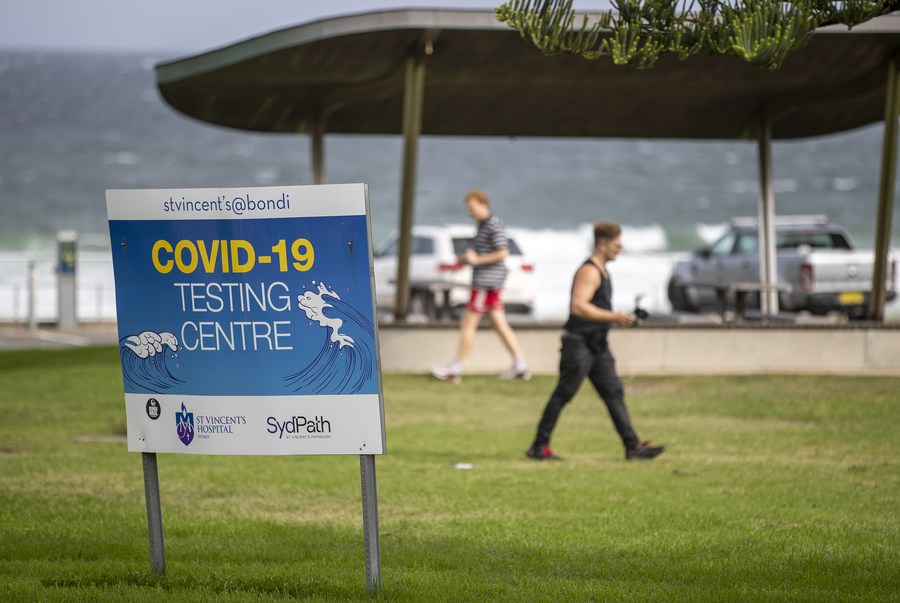
People walk near a COVID-19 test center in Sydney, Australia, March 30, 2022. (Xinhua/Bai Xuefei)
"It's just a populist move to say 'COVID-19 is no longer here, let's forget about it, let's get back to our normal lives.'"
"Unfortunately, the virus doesn't know that, the virus is still there. It's still infecting people, killing people and putting people in hospital."
SYDNEY, April 21 (Xinhua) -- As the world struggles through the third year of the pandemic, leaders of countries such as Australia are encouraging a "living with COVID-19" mindset, a seemingly relaxed attitude which could prove deadly, according to a prominent scientist.
Professor Adrian Esterman, chair of biostatistics and epidemiology at the University of South Australia, told Xinhua on Tuesday that such an approach to the highly contagious disease is especially dangerous for older and frail people and, as such, should not replace proven safety measures such as high vaccination rates, mandatory wearing of face masks and social distancing.
"Even old people who are fully vaccinated are still at high risk of serious infection if they get infected," Esterman said, adding that although the Omicron variants were much milder than Delta, "a small percentage of people will get severely ill and die ... even those who are very fit and young."

People visit the Sydney Royal Easter Show in Sydney, Australia, April 11, 2022. (Photo by Hu Jincheng/Xinhua)
The long-term symptoms of COVID-19 are another major concern that Esterman believes may impose heavy burdens on victims of the illness and the healthcare system.
"We don't know an awful lot about long COVID," he conceded. "There are so many symptoms that people get: brain shrinkage, brain fog, severe headaches, severe fatigue, problems within nervous system, problems with their heart, problems of the respiratory system ... the list just goes on."
"It's way worse than viruses like influenza; there's such a lot of people ending up with long-term problems and a wide variety of symptoms."
With so much at stake, Esterman is concerned that countries such as Australia and Britain are prematurely easing essential safety measures which he believes is a "retrograde step."
"It's just a populist move to say 'COVID-19 is no longer here, let's forget about it, let's get back to our normal lives.'"
"Unfortunately, the virus doesn't know that, the virus is still there. It's still infecting people, killing people and putting people in hospital."
"This is what it's like now in Australia. There are very few public health restrictions. The state and territory governments and the federal government have left people to fend for themselves. I think that's a terrible shame because one of the first jobs of any government is to protect the public."

People shop at a supermarket in Sydney, Australia, on April 7, 2022. (Photo by Hu Jingchen/Xinhua)
His prognosis appears well-founded given the latest national COVID-19 figures which show that as of Monday, 6,786 people had died of the illness in Australia since the start of the pandemic with 4,547 of those deaths having been in 2022.
Regarding the COVID-19 situation in Shanghai, Esterman said he believed Chinese health authorities faced an uphill battle given the high infectiousness of the Omicron variant.
Esterman believes the authorities need to ensure a high rate of vaccination, along with the other proven safety measures including adequate ventilation systems.
"I think China can still control the numbers and ensure that the hospital system doesn't get swamped. Just dampen down the number of cases so the health systems can manage well."■












